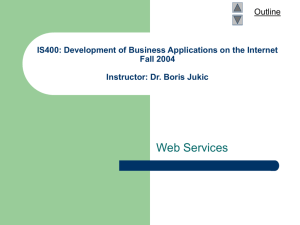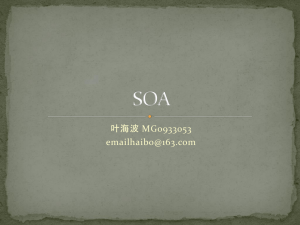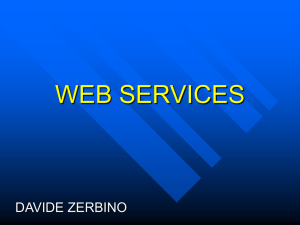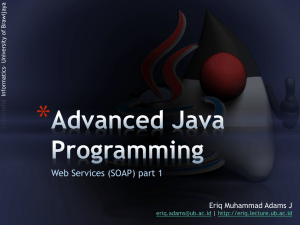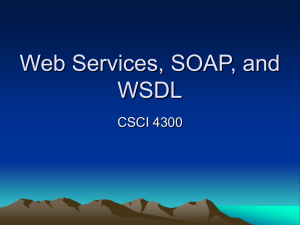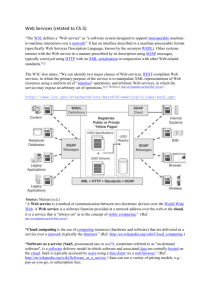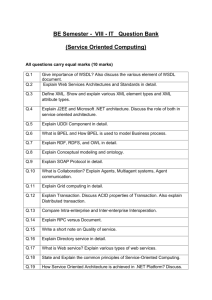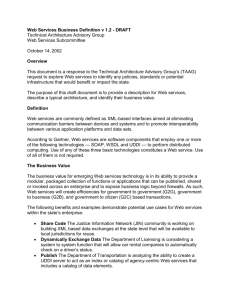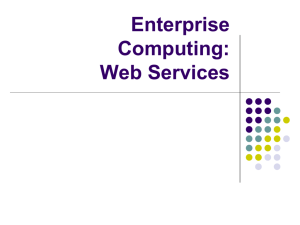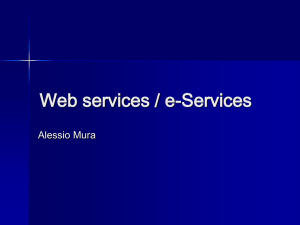Web Services Slides
advertisement
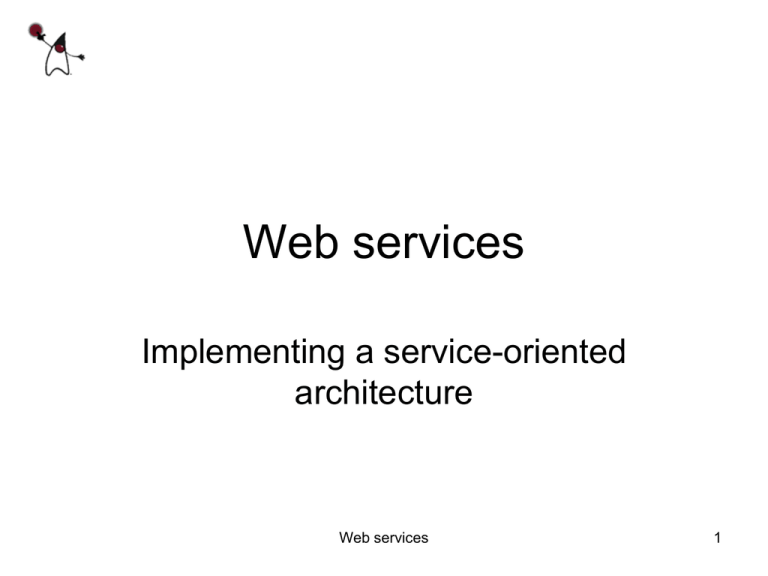
Web services Implementing a service-oriented architecture Web services 1 SOA Service-Oriented Architecture • Nodes in a network make resources available to other participants in the network as services • Accessed in a standardized way • Loosely coupled services • Platform independent • Programming language independent • Web services makes SOA happen! Web services 2 SOA terms • Service – Business function – Accepts requests, produces responses • Provider – Function which performs a service in response to a request from a consumer • Consumer – Function which consumes the result of a service supplied by a provider • Discovery – Ability to identify services – Using a repository / registry • Binding – Relationship between provider and consumer is dynamic • Established at runtime Web services 3 Web services The idea • Technology that allows applications to communicate • Web services are – Platform independent – Programming language independent – Send XML messages – Can use many transport protocols – Uses open standards Web services – Developed by technical people – Aggregated into solving business problems by business people 4 Web services standards Open standards defined by – W3C http://www.w3.org – OASIS http://www.oasis-open.org • Supported by any major company – Microsoft – Sun Microsystems – IBM – Oracle – and many others Web services 5 Web services, technologies • SOAP – Simple Object Access Protocol • WSDL – Web Service Description Language • UDDI – Universal Description, Discovery, and Integration • XML – eXtensible Markup Language – Used by all web service technologies Web services 6 XML • Language to describe data to be exchanged on the web Example XML document – And many other things – Programs exchange XML documents – XML documents are processed by programs • Mark up language – XML tags structures information • Element – <tag>…</tag> – An element may have many subelements <persons> <person> <name>Anders</name> <city>Roskilde</city> </person> <person> <name>Peter</name> <city>Sorø</city> </person> </persons> • Nested elements – An element has exactly 1 superelement • Except the root element, which has 0 super-elements Web services 7 Structure in XML documents • Well-formed • Valid – All start-tags must have a matching end-tag • <person>…</persons> – Tags must be properly nested • <persons> • <person>…</person> • </persons> – Well-formed – Conforms to an XML schema • A set of “grammar rules” • Specifies which tags are allowed, etc. – Only 1 outer tag • Called the root element Web services 8 SOAP • XML is fine for data exchange, but it’s not enough – We need distinction between the header and the body of the message • Like in HTTP • A SOAP message in an XML document consisting of – – – – Envelope (mandatory) Headers (optional) Body (mandatory) Example • http://java.sun.com/developer/technicalArticles/WebServices/soa2/ WSProtocols.html – Attachments (images and other binary content) Web services 9 SOAP Simple Object Access Protocol • SOAP messages can be transported using any transport protocol – – – – HTTP SMTP Others SOAP messages are tunneled through firewalls • SOAP messages can be produced and consumed using any programming language – Sender and receiver can be written in different programming language – Sender and receiver need not know what programming language the other part was written in Web services 10 WSDL Web Services Description Language • Clients use a WSDL file to learn how to call a web service • WSDL file is an XML document describing the public interface to a web service – Message formats • Operations – Methods which can be called on the web service – Parameters and return types to the methods – Protocol bindings • Protocol used for transportation – Examples • http://java.sun.com/developer/technicalArticles/WebServices/ soa2/WSProtocols.html Web services 11 UDDI Universal Description, Discovery, and Integration • An UDDI registry is like a phone book (yellow pages) – Web service producers register • • • • Details of the business providing the service Informal description of the functionality of the service Location of the WSDL file Information allowing users to register for information about updates to the service – Web service consumers search the registry for useful services • UDDI uses XML for registration • Several organizations run public UDDI registries – IBM – Microsoft – Others • Private UDDI registries – Most UDDI registries are found inside companies Web services 12 Legacy system services • Legacy / existing systems can be re-used by wrapping them as web services. • Existing system can be used inside and outside the company. Web services 13 Web service security • Integrity – SOAP messages are not tampered with • Confidentiality – SOAP message can only be seen by intended recipients • Authentication – Web service can only be called by authenticated clients • Underlying technologies – Secure Socket Layer (SSL) – And many others Web services 14 WS-BPEL Web Services Business Process Execution Language • Business processes means calling more web services in a specific sequence. • BPEL coordinates web services – Web services are components – BPEL defines a sequence (work flow) of calls to web services Web services 15 JAX-RPC / JAX-WS Java API for XML-based RPC • RPC – Remote Procedure Call – Calling a method on a remote object • JAX-RPC – Using web services to call remote methods from a Java program • How it works 1. Java program invokes a method on a stub 2. Stub invokes routines in the JAX-RPC runtime system (RS) 3. RS converts the remote method invocation into a SOAP message 4. RS transmits the message as an HTTP request • • JAX-RPC is part of Java Enterprise Edition (J2EE) JAX-WS is the new version of JAX-RPC Web services 16 JAX-RPC data types • Primitive types – Works well – As primitive types or wrapper classes • Integer ~ int • Collections – Arrays [ ] work – List, etc. work. • Custom types (your own classes) – Must be XML serializable • No-arg constructor • Get and set methods on all properties • Exceptions – Send as SOAP Faults (wrapped) – Can be quite hard to understand on the client side Web services 17 • References and further reading Web services in general Ed Ort Service-Oriented Architecture and Web Services: Concepts, Technologies, and Tools, Sun 2005 – • Misc. references – – – – • • • • • http://java.sun.com/developer/technicalArticles/W ebServices/soa2/WSProtocols.html http://en.wikipedia.org/wiki/SOAP_(protocol) http://en.wikipedia.org/wiki/Webservices http://www.w3.org/2002/ws/ http://www.w3schools.com/webservices/ (ASP.NET) Martin Kalin Java Web Services, O’Reilly 2009 Bill Burke RESTful Java with JAX-RS, O’Reilly 2009 John Flanders RESTful .NET, O’Reilly 2008 Singh et al. Designing Web Services with the J2EE 1.4 Platform, Addison Wesley 2004 Companies – – – http://www-01.ibm.com/software/solutions/soa/ http://www.oracle.com/technologies/soa/index.ht ml http://java.sun.com/webservices/ Web services 18 References, technologies • XML • UDDI – http://en.wikipedia.org/wiki/XML – http://www.w3schools.com/xml/ – http://www.w3.org/XML/ • SOAP – http://en.wikipedia.org/wiki/UDDI – http://www.uddi.org/ – http://uddi.microsoft.com/ • JAX-RPC / JAX-WS – http://en.wikipedia.org/wiki/SOAP _(protocol) – http://www.w3.org/2000/xp/Group / – Englander Java and SOAP, O’Reilly 2002 – http://en.wikipedia.org/wiki/JAXRPC – http://en.wikipedia.org/wiki/JAXWS • Web service catalogs • WSDL – http://www.remotemethods.com/ – http://www.webservicex.net/WS/ – http://en.wikipedia.org/wiki/Web_ Services_Description_Language – http://www.w3.org/2002/ws/desc/ Web services 19
